Factsheet for DHIS2 for Hypertension & Diabetes Programs

DHIS2 Tracker is a free, open-source health management data platform developed by DHIS2 and Resolve to Save Lives that program managers can use to monitor large-scale non-communicable disease (NCD) programs. The new version 2.0 integrates hypertension and diabetes care and is optimized for use in busy primary care facilities that manage thousands of patients. DHIS2 […]
Considérations Liées au Développement d’un Institut National de Santé Publique (INSP)
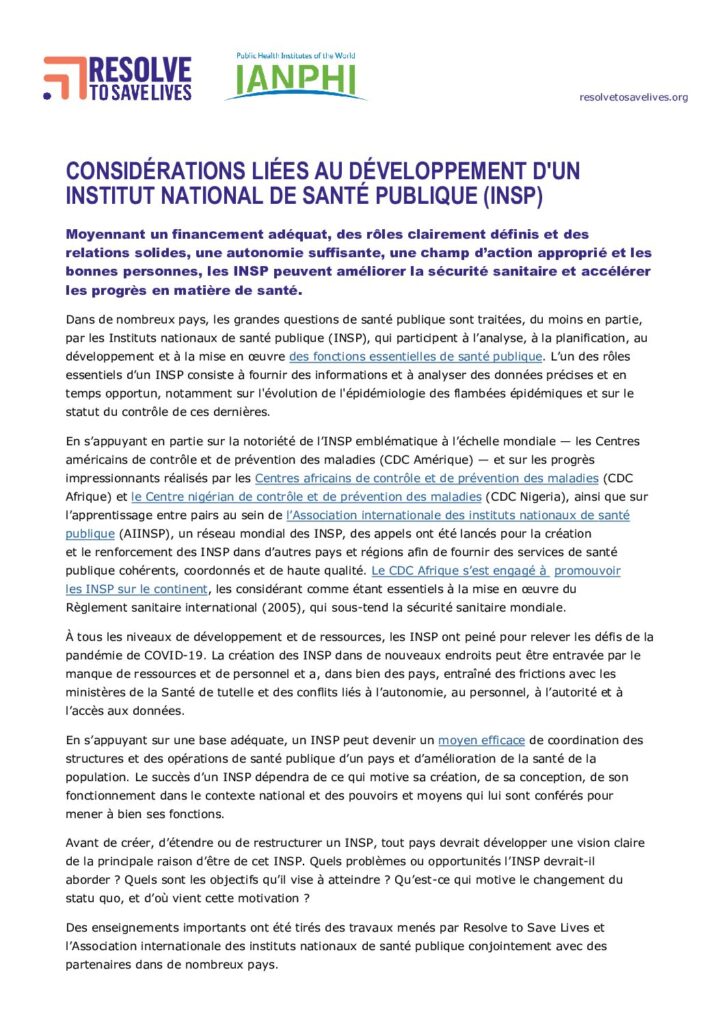
Ensiegnements et recommandations tirés des travaux menés par Resolve to Save Lives et l’Association internationale des instituts nationaux de santé publique conjointement avec des partenaires dans de nombreux pays.
Conseils pour la mise en place d’une communauté virtuelle de pratique

Guide pour la mise en place d’une communauté virtuelle de pratique.
Dedicated Preparedness Teams
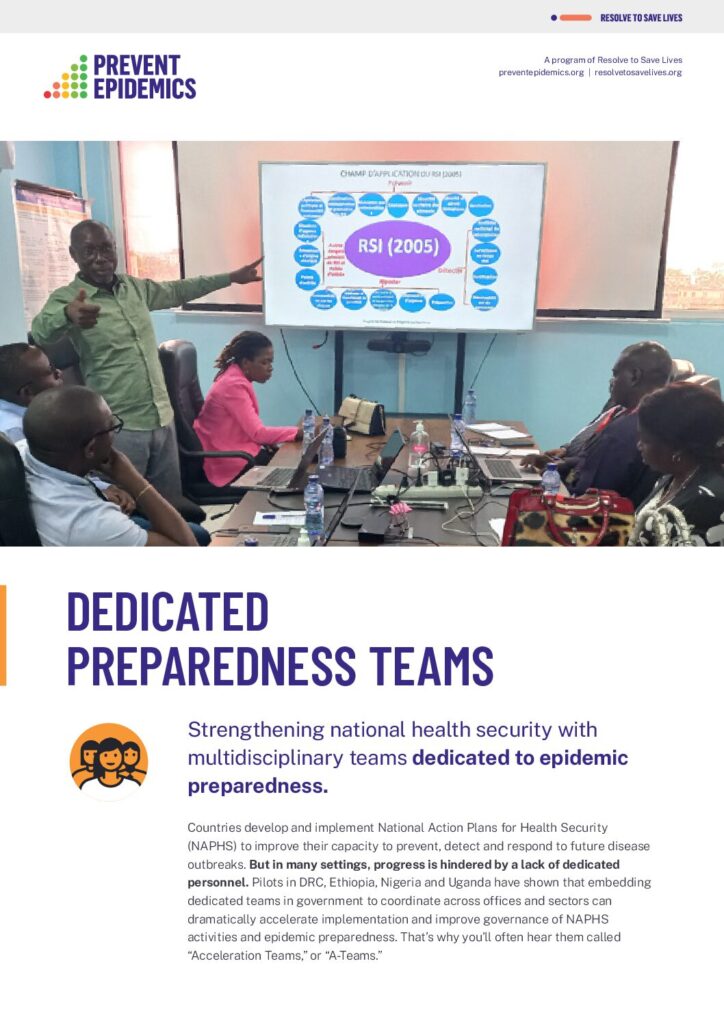
Strengthening national health security with multidisciplinary teams dedicated to epidemic preparedness.
Évaluation Externe Conjointe
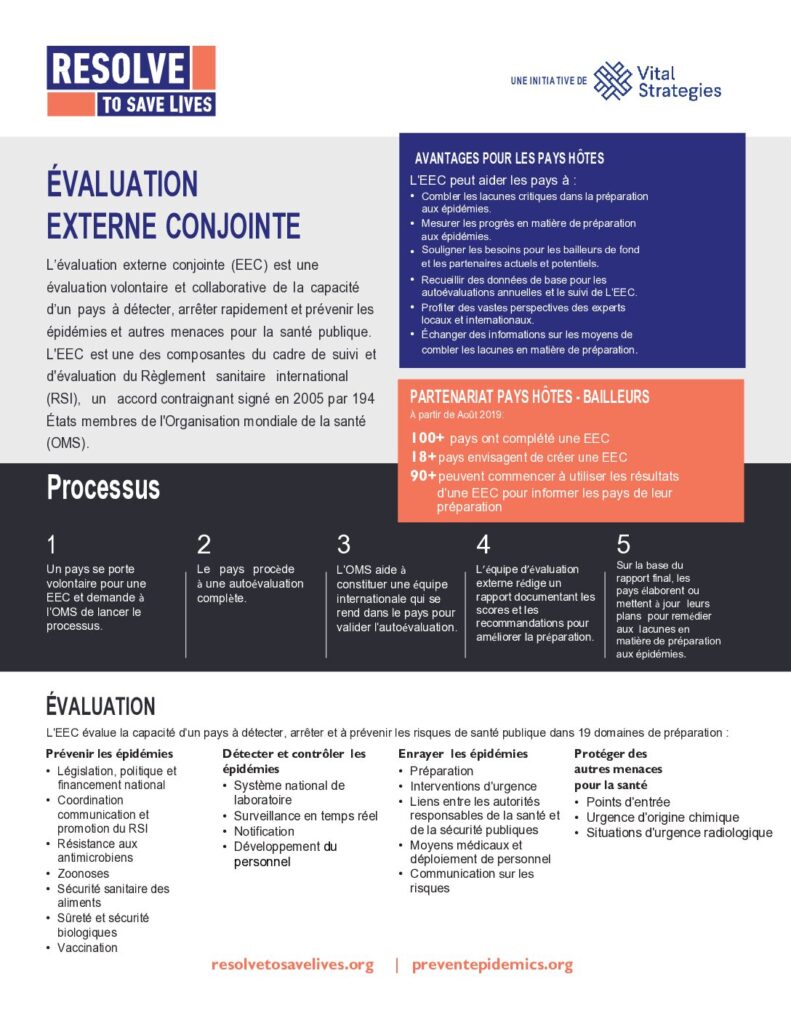
Fiche d’information sur l’évalution externe conjointe (EEC).
Comment gérer efficacement les groupes en ligne
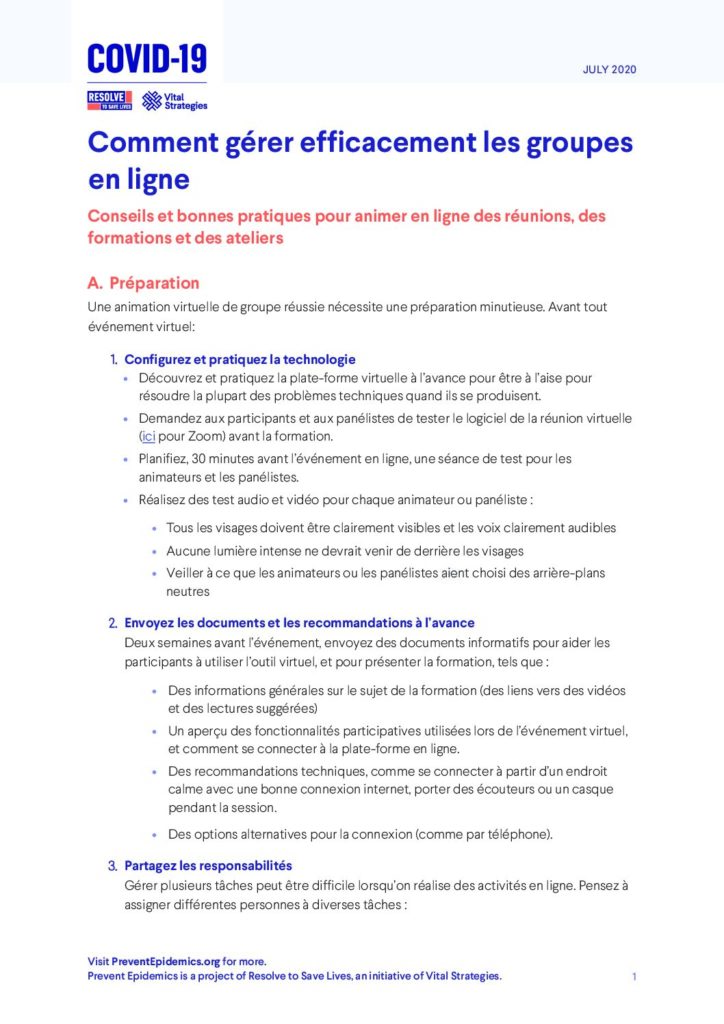
Conseils et bonnes pratiques pour animer enligne des réunions, des formations et des ateliers.
Comment animer une formation de formateur
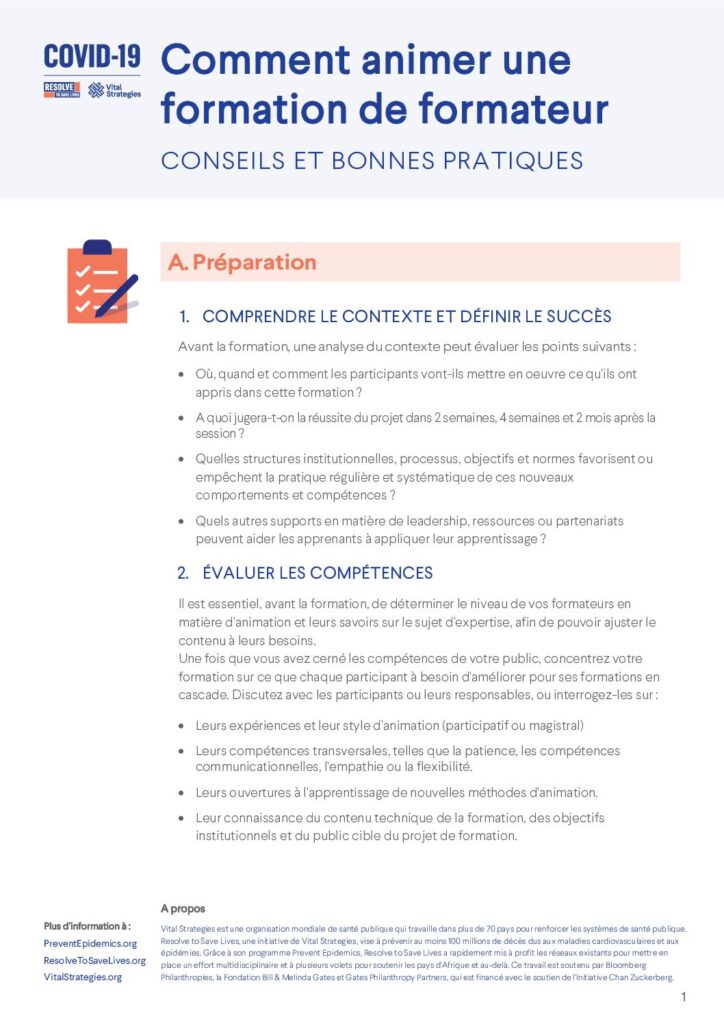
Conseils et bonnes pratiques pour animer une formation de formateur.
12 Characteristics of an Effective Public Health Emergency Law
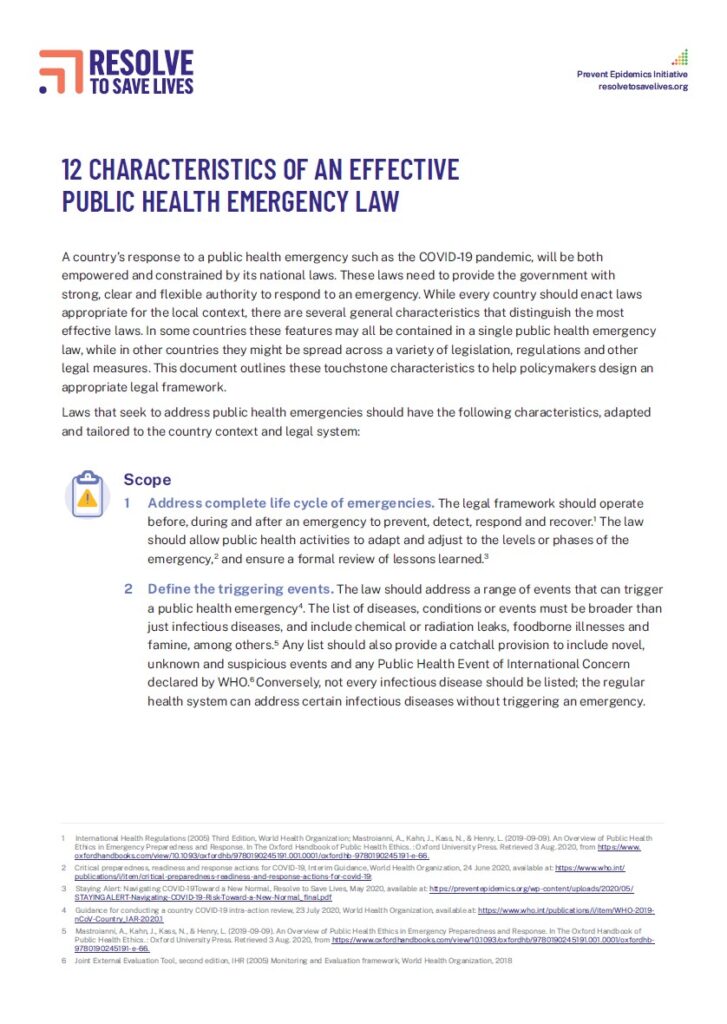
An outline of 12 characteristics that make a public health law effective, to help policymakers design appropriate legal framework.
Annex 1: How to create a COVID-19 alert-level system and supporting communication tools in resource-constrained settings
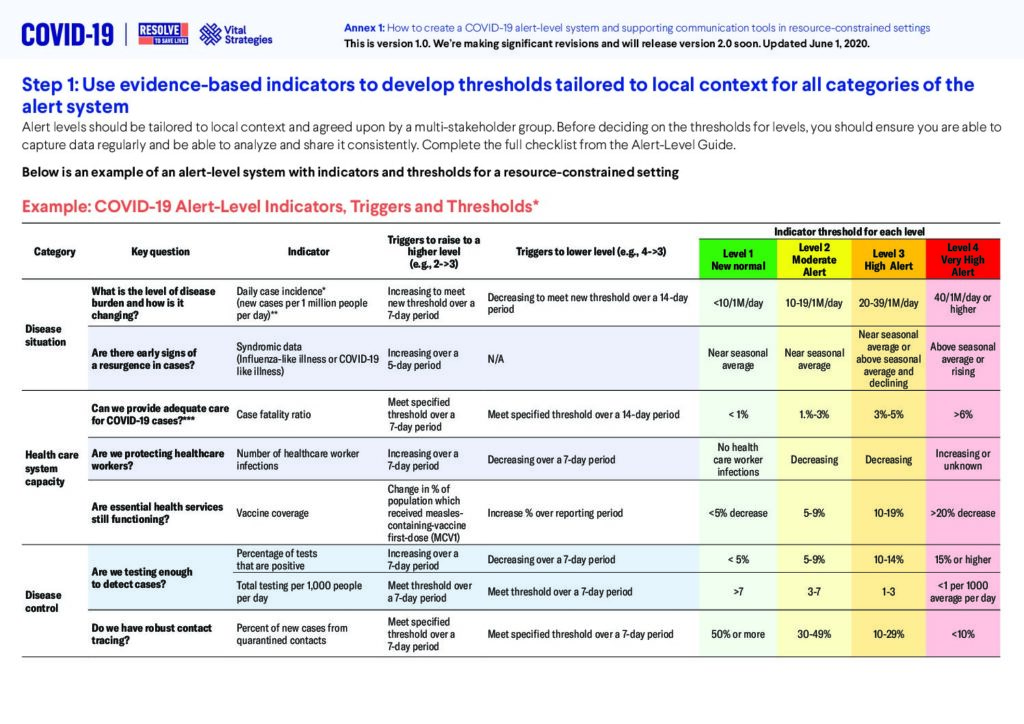
Step-by-step guidance on creating an alert-level system.
Elements Of A Media Advocacy Campaign: What You Need to Know
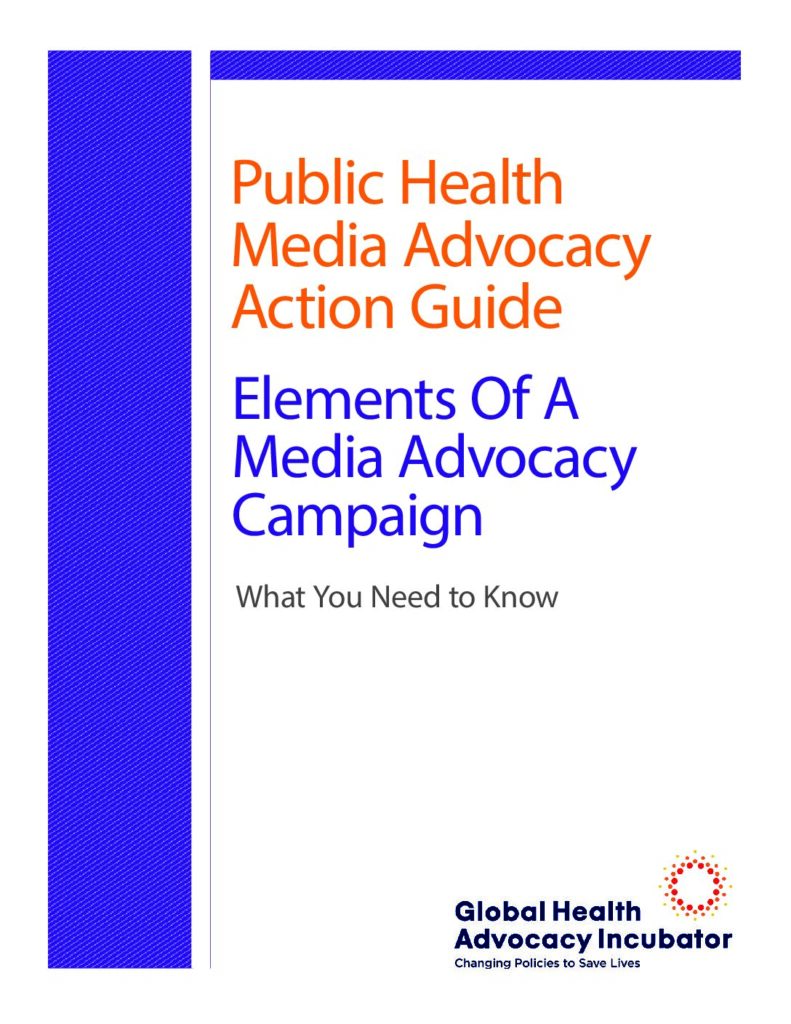
A guide designed to help civil society organizations plan public health media advocacy through a media advocacy campaign.
Strengthening Epidemic Preparedness at the Country Level
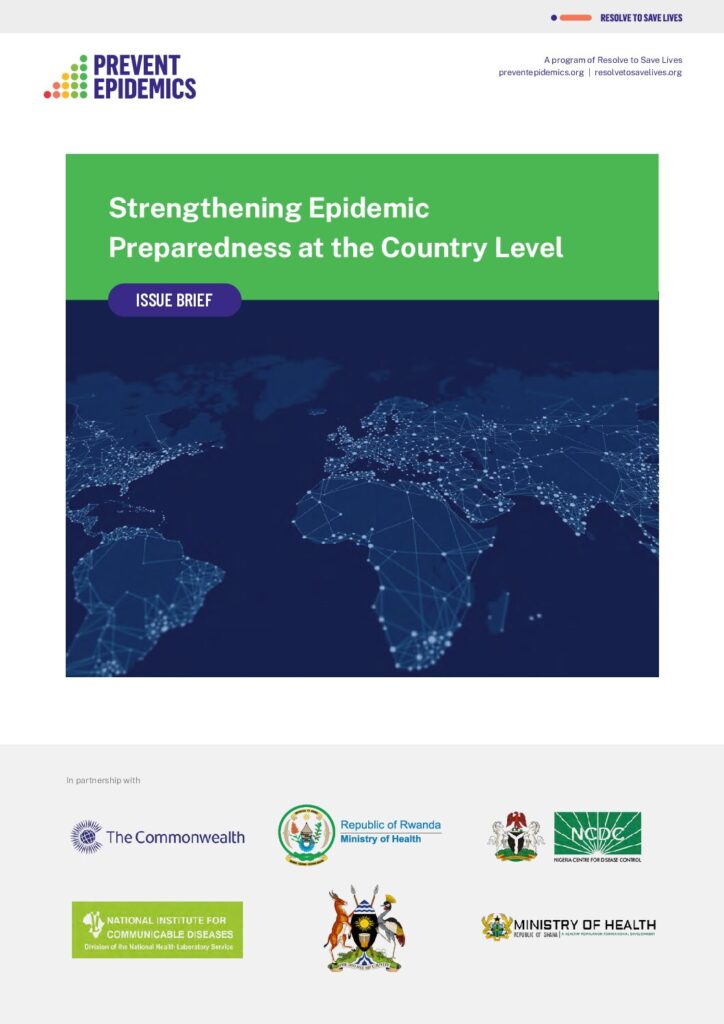
In partnership with public health institutions in eight African countries, Resolve to Save Lives released an issue brief outlining five proven approaches for national governments to significantly improve epidemic detection and containment in their communities. The model is based on joint efforts among African nations to mitigate the spread of COVID-19 and other infectious diseases […]
7-1-7 Pilot Project
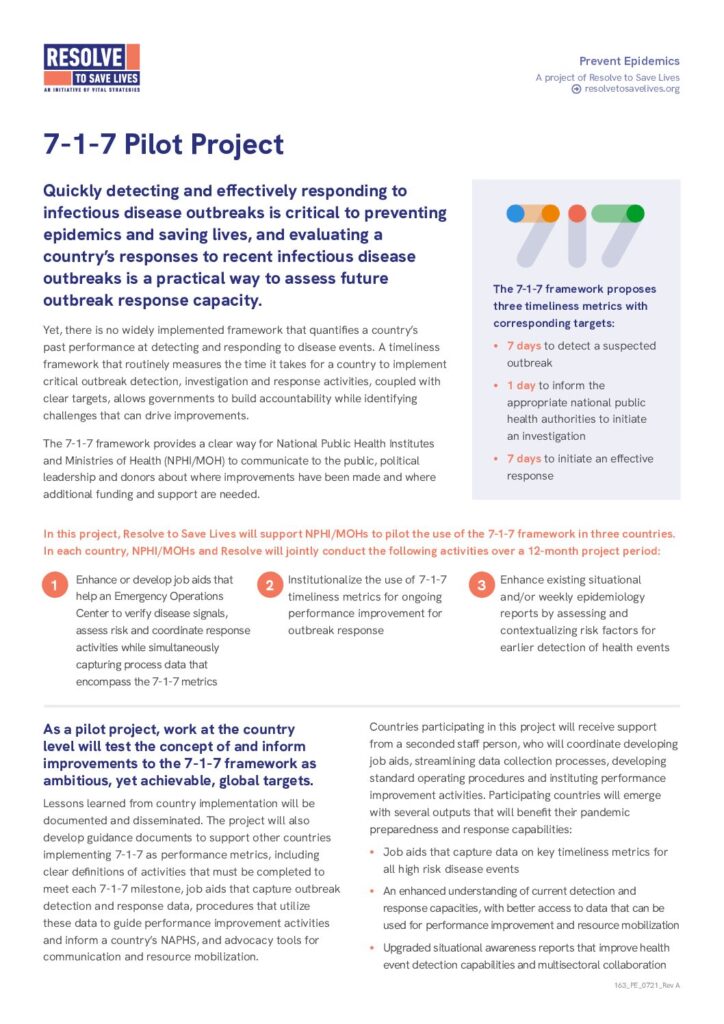
The 7-1-7 framework helps countries strengthen their outbreak detection and response by setting clear targets: 7 days to detect a suspected outbreak, 1 day to inform public health authorities, and 7 days to initiate a response. This pilot project tested the framework in three countries to improve pandemic preparedness and guide performance improvements.
Building resilient populations in the face of COVID-19
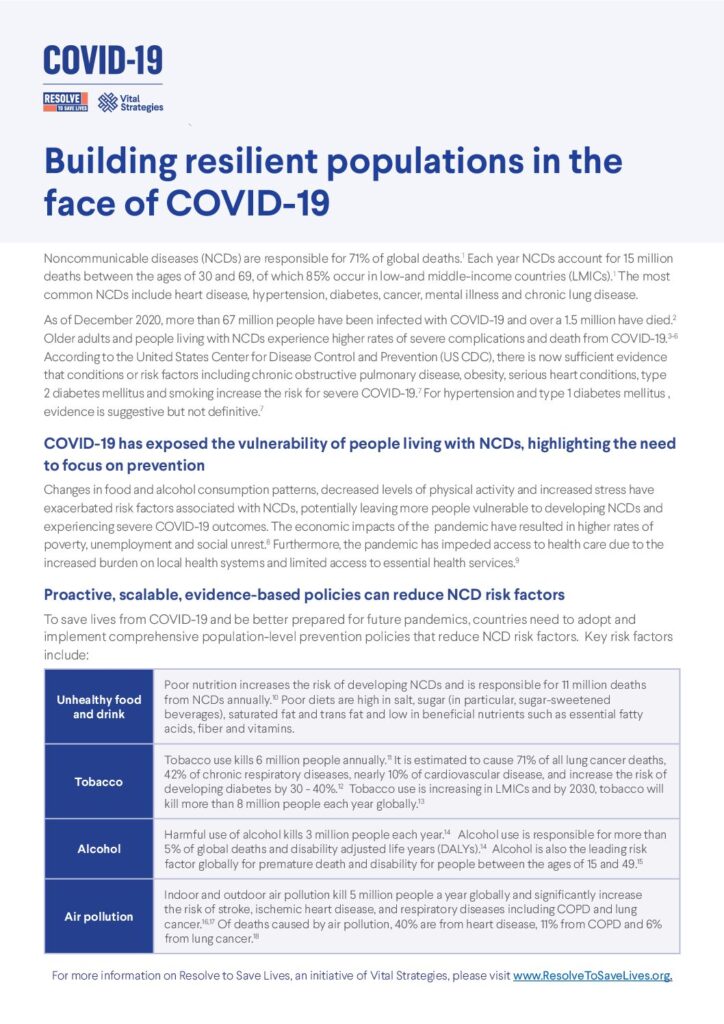
This document highlights the need to reduce noncommunicable disease (NCD) risk factors—such as poor nutrition, tobacco, alcohol use, and air pollution—in order to protect populations from severe COVID-19 outcomes and future pandemics. It recommends evidence-based policies, like trans fat elimination and tobacco control, to build resilience and promote healthier, longer lives.
Designing tools that work for health care workers
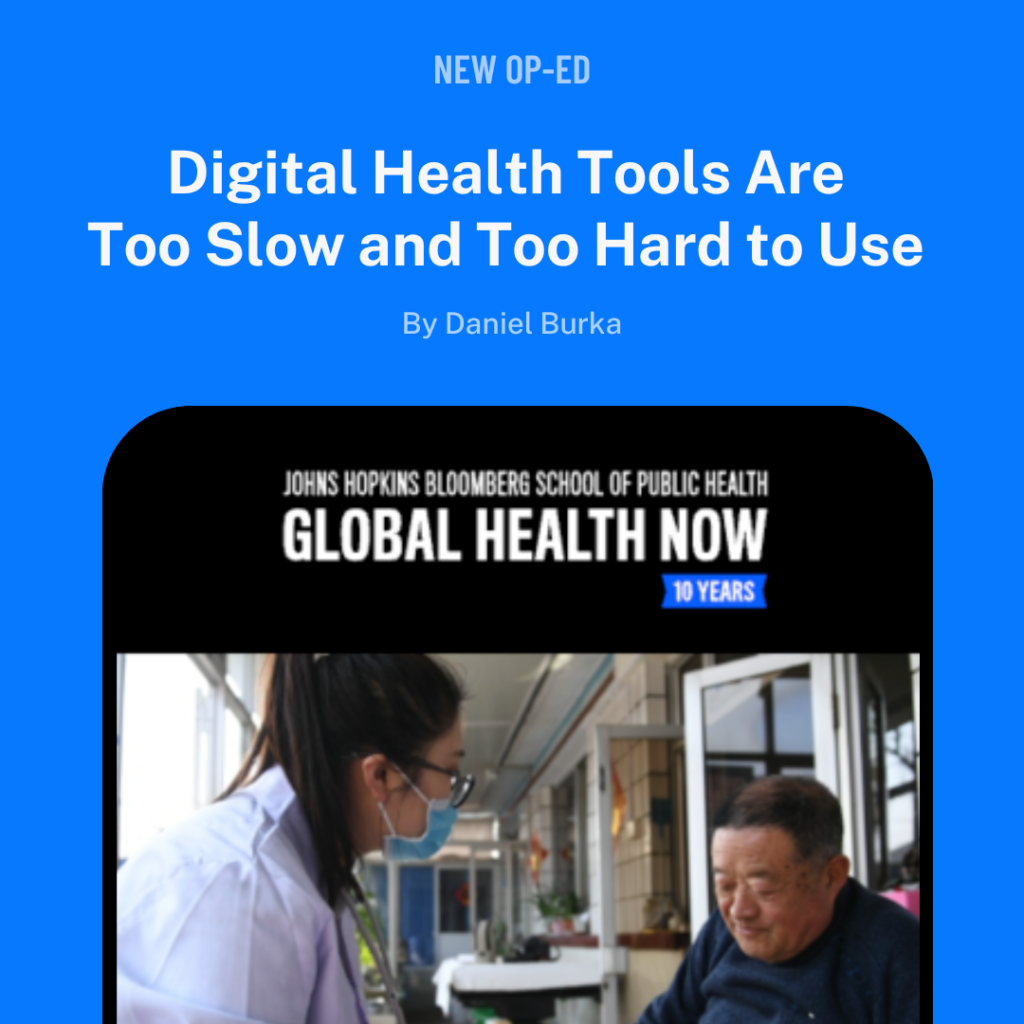
Daniel Burka, Director of Design for the digital team at Resolve to Save Lives, shares how any design team can create health care software that is easy to use, improves programs, and that health workers actually like.
Research Roundup: March to July 2024
At Resolve to Save Lives, we use our deep technical expertise to support countries in saving lives from the world’s leading killers. Check out these six peer-reviewed articles that RTSL staff contributed to last quarter!
REPLACE Initiative’s role in ending trans fat

Since the formation of the global partnership and launch of REPLACE, 43 countries have taken action against the harms of trans fat.
WHO’s HEARTS package significantly improves high blood pressure control
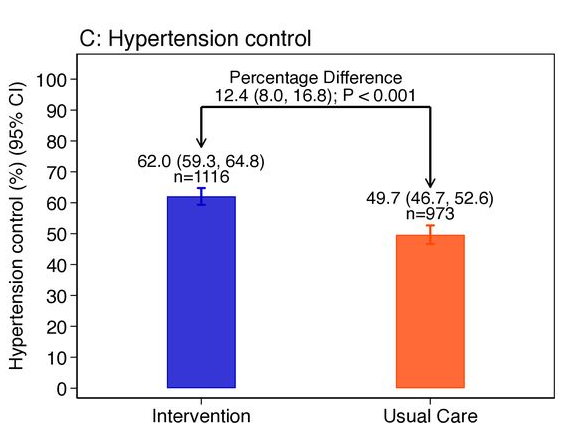
A new trial published in BMJ’s Heart Journal shows that the WHO-HEARTS technical package, developed and championed with support from Resolve to Save Lives, significantly improves high blood pressure treatment and control.
Drs. Tom Frieden and Tedros Adhanom Ghebreyesus on global progress eliminating trans fat

In BMJ and Al Jazeera: The world has made encouraging progress to eliminate trans fat, but more than 4 billion people remain at risk.
WHO’s 5-year milestone report on global trans fat elimination

By 2023, best-practice policies were in effect in 53 countries, covering 3.7 billion people or 46% of the world’s population, as compared to 6% just 5 years prior.
Milestone 5-year report on progress to eliminate toxic trans fat released
Statement from Dr. Tom Frieden, President & CEO, Resolve to Save Lives 24 JUNE 2024 (NEW YORK, USA)—“At the start of 2024, 53 countries had introduced trans fat regulations, protecting nearly half of the world’s population from this toxic chemical and preventing as many as 183,000 deaths each year. The new 5-year REPLACE report released […]
Growing adoption of 7-1-7 on display at the 2024 Global Health Security Conference

On June 20, 2024, the 7-1-7 Alliance hosted a packed networking breakfast at the Global Health Security Conference in Sydney for partners engaged in the adoption and use of the 7-1-7 target for the timely detection, notification and response of infectious disease outbreaks.
New report offers lessons on stopping disease outbreaks, amid global spread of H5N1
Resolve to Save Lives report shows how public health specialists around the world controlled bird flu and other outbreaks last year June 18, 2024 (New York, NY) – With the highly contagious H5N1 avian influenza (bird flu) spreading worldwide, Finland provides a lesson in how to bring an outbreak under control quickly. After a deadly outbreak […]
Conference talk shows how DHIS2 app achieves real-world results

At the 2024 DHIS2 conference in Oslo, DHIS2, FHI 360 and RTSL showed how a user-centered approach to DHIS2 Android app development achieved real-world results in Nigeria and Central Asia.
DHIS2 3.0: The user-centered health care app gets a big update

The new updates reduce hypertension program enrollment time by 3 minutes per patient.
Five countries commit to implementing comprehensive sodium reduction policies to improve health and save at least 39,000 lives per year
New commitments made at 77th World Health Assembly event hosted by Resolve to Save Lives and NCD Alliance 28 May 2024 (GENEVA, SWITZERLAND)—Bangladesh, Cameroon, Malaysia, Nigeria, and Singapore made new commitments today to implement comprehensive policies that will protect their populations from the harms of high-sodium diets. These commitments, made during the 77th World Health […]
Salt reduction event at 77th World Health Assembly
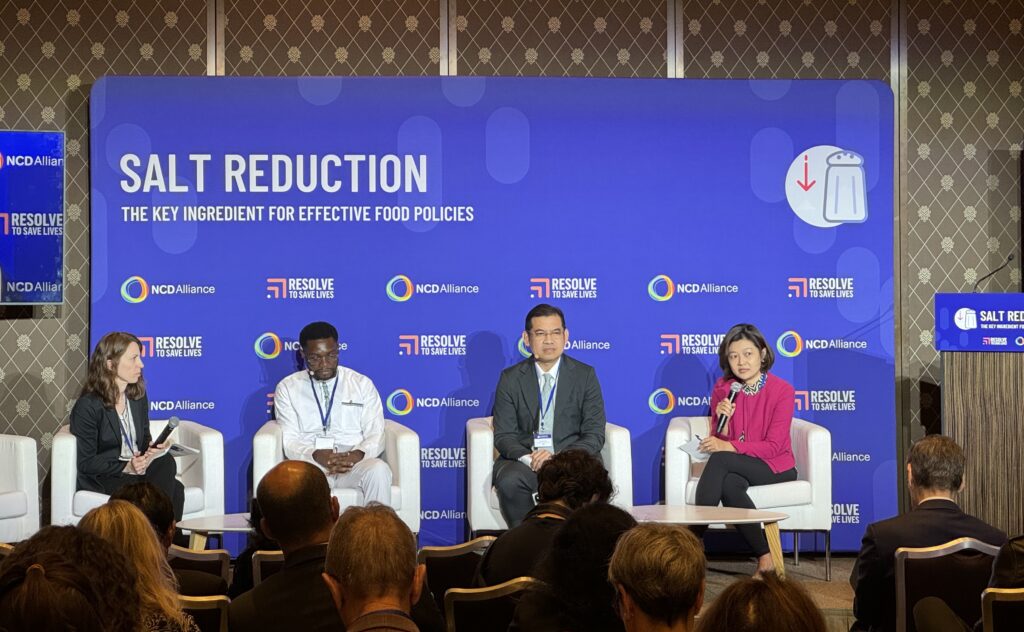
At the event we co-hosted with the NCD Alliance and WHO, Bangladesh, Malaysia, Nigeria, and Singapore made new commitments to implement comprehensive policies that will protect at least 37,000 people from the harms of eating too much salt.
New video guide for fast and simple user testing for health care software

A monthly cycle of testing software with end users is necessary to build good software that drives program improvements.
Webinar: Designing digital tools with health care workers at the center

For the launch of our new digital tools playbook, we cohosted a webinar with the Bill and Melinda Gates Foundation on designing digital health tools with the end user at the center.
The Simple app manages more than 4 million patients—and health workers love it
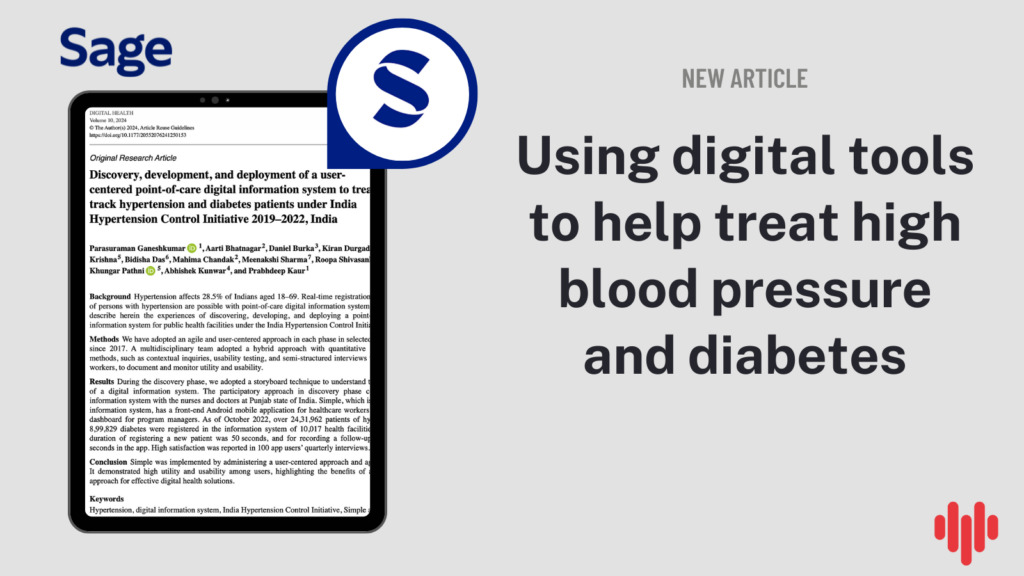
In a new article for Sage Publications, Resolve to Save Lives and the DHIS2 team talk about collaborating with health care workers to design an app that doctors and nurses love to use.
RTSL releases first-of-its-kind guide to effective, user-centered digital health tools
New playbook summarizes lessons from hundreds of health care workers and millions of patients on how to build a digital tool that saves time and lives May 8, 2024 (NEW YORK, NY)— A new playbook released by Resolve to Save Lives (RTSL) compiles lessons learned from five years of health care workers using the Simple […]